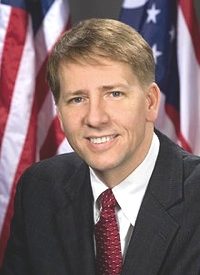
While Congress remains on winter recess, President Obama hoodwinked his Senate Republican rivals of the newly-minted Consumer Financial Protection Bureau by naming former Ohio Attorney General Richard Cordray (left) the nation’s chief consumer watchdog, sidestepping the Senate confirmation process. Mr. Cordray boarded Marine One on Wednesday for a brief flight to Andrews Air Force Base, where he joined the President in his hometown of Cleveland for a formal announcement.
With a director now in place, the agency will have the power to establish new regulations over financial institutions, including mortgage companies, debt collectors, payday lenders, and other entities often charged with contributing to the financial crisis. Moreover, the bureau will now be able to monitor mortgage originators and servicers, which were instrumental in the financial crisis by providing subprime mortgages to individuals and families who were not able to afford them.
“There is an army of lobbyists and lawyers right now working to water down the protections and the reforms that we passed,” the President said in July when he nominated Cordray to head the bureau. “They’ve already spent tens of millions of dollars this year to try to weaken the laws that are designed to protect consumers. And they’ve got allies in Congress who are trying to undo the progress that we’ve made.”
Senate Republicans had previously thwarted Cordrays appointment, and refused since summer to approve any nominee until adjustments were made to the agencys governance. Their contention with the bureau, which was established through the Dodd-Frank financial reform legislation, is that it harbors too much unchecked power, a prescription for potential abuse.
“Until President Obama addresses our concerns by supporting a few reasonable structural changes, we will not confirm anyone to lead it,” Sen. Richard Shelby (R-Ala.), the ranking member of the Senate Banking Committee, warned in July. “No accountability, no confirmation.”
News of Obamas appointment has outraged Republicans, as Reince Priebus, chairman of the Republicans National Committee, called it “outrageous,” “crazy,” and “unreal.” Others, like Senate Minority Leader Mitch McConnell (R-Ky), said the Presidents appointment is arrogant and an blatant abuse of executive power. “This recess appointment represents a sharp departure from a long-standing precedent that has limited the President to recess appointments only when the Senate is in a recess of 10 days or longer,” McConnell said Wednesday in a statement.
In defending the move, Obama said every day Cordray was delayed confirmation millions of Americans remained vulnerable to deceptive and unscrupulous financial practices. “That’s inexcusable,” Obama imputed in his prepared remarks. “And I refuse to take ‘No’ for an answer. I’ve said before that I will continue to look for every opportunity to work with Congress to move this country forward. But when Congress refuses to act in a way that hurts our economy and puts people at risk, I have an obligation as president to do what I can without them.”
Senate Democrats hailed the move, affirming that Cordray is more than qualified for the position, while they censured Republicans for repeatedly stonewalling the appointment. “Mr. Cordray is eminently qualified for the job, as even my Senate Republican colleagues have acknowledged,” asserted Chairman of the Banking Committee Sen. Tim Johnson (D-S.D.). “Its disappointing that Senate Republicans denied him an up-or-down vote, especially when its clear he had the support of a majority of the Senate.”
Some consumer groups also vocalized their support. “American consumers cannot wait any longer while Senate Republicans and industry lobbyists play games with the nomination process,” said Lauren Saunders, an attorney at the National Consumer Law Center. “With a director finally in place and no question about its powers, the Consumer Financial Protection Bureau can start scrutinizing unfair practices by debt collectors, mortgage brokers, credit reporting agencies, and predatory payday lenders.”
However, beyond the debate over Cordrays qualifications and the overall governance of the Consumer Financial Protection Bureau, are questions over the lawfulness of the appointment.
Ironically, candidate Obama railed against President George W. Bush in 2008 for his reckless abuses of executive power: “This is part of the whole theory of George Bush that he can make laws as he is going along. I disagree with that. I taught the Constitution for 10 years. I believe in the Constitution and I will obey the Constitution of the United States. We are not going to use signing statements as a way of doing and end run around Congress.” But now, Obama himself refuses “to take No for an answer.”
Some critics question the constitutionality of the Presidents executive move. Phil Kerpen of Fox News wrote, in an opinion article titled “Obamas Cordray Appointment Mocks the Constitution”:
If he were acting within the confines of the law and the Constitution, the argument might make sense. But Obama has now adopted a theory of executive power so expansive that a reporter at a recent press conference understandably asked whether the president believes we have a virtual monarchy, a president of unlimited powers subject only to periodic elections but not to the rule of law.
House Speaker John Boehner (R-Ohio) added to Kerpens analysis: “It’s clear the president would rather trample our system of separation of powers than work with Republicans to move the country forward. This action goes beyond the president’s authority, and I expect the courts will find the appointment to be illegitimate.”



